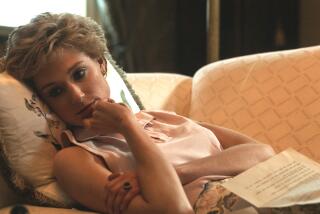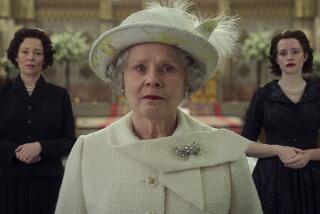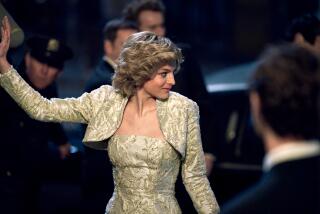TV REVIEW : The Further Adventures of Diana and Charles
- Share via
Those rollicking relics, the British royals, are at it again, spewing regal dirt. This latest journey through the valley of the shocking truth is an entertaining, good-looking two-part biography on NBC that’s not to be taken seriously. Unless you take them seriously.
“Diana: Her True Story” is obviously not his story. Prince Charles is the unfeeling, aristocratic slug who drives his despairing young wife to bulimia and attempted suicide in television’s version of Andrew Morton’s tale-telling book (it airs at 9 p.m. Sunday and Monday on Channels 4, 36 and 39). Stephen Zito (“Fergie & Andrew: Behind Closed Doors”) wrote the script, and Morton was an associate producer.
Whether in talk shows, tabloids or prime time, the royals are an unstoppable topic. NBC’s “Diana” is arriving less than four months after ABC’s very own “Charles and Diana: Unhappily Ever After.”
Although NBC’s kidney pie melodrama is not much to chew on, or even titillating, it’s served elegantly. Anglophiles won’t be the only ones swooning over the sights.
Although a head shorter than her Charles, Serena Scott Thomas makes an otherwise convincing Diana, entering British history like a fresh virgin about to be sacrificed on the altar of palace protocol, ascending from fun-loving, privileged commoner to misery as a slave of tradition and wife of a cold man who can’t stand her.
On paper, she has some prime qualifications for being wife to the heir to the throne. She’s pretty, she’s well-bred, she wants “the job,” as it’s called by the royals, and even more critically, she has vowed to have “no sex before marriage.” Plus, she is cheery about such things as perfecting her royal wave.
Yet this is a mismatch from the start, as Diana begins to suspect that the mastodon she is about to marry is less the prince of her dreams than her worst nightmare, a man stubbornly refusing to severe his ties with a former girlfriend, Camilla Parker-Bowles. It’s too late to turn back, though, and the wedding--which captures the attention of the world--takes place as scheduled.
Two sons later, Diana remains lonely and miserable as the Princess of Wales, submerging herself in self-destructive binges. Only later does this tragic heroine stiffen her backbone and pursue an independent, productive life leading to a negotiated separation from Charles.
If Thomas is a believable Diana, director Kevin Connor has allowed the usually able David Threlfall to transform Charles into a comical caricature, someone who is not merely dull and humorless, but flat-out dead. Affecting a nervous tic, Threlfall has Charles speak as if he were a ventriloquist attempting to throw his voice without moving his lips. This Charles has the thudding grace of a yak. He is an incredibly dense, stuffy, one-dimensional, insensitive, unsympathetic man who is not only indifferent to his children, but also can’t seem to fathom his wife’s resistance to that hussy Camilla (Elizabeth Garvie), who later would co-star with Charles in the infamous alleged Camillagate tapes.
With Charles ogling her like French pastry, Camilla first surfaces at a party where he is courting Diana. “Lovely girl,” someone sniffs about Camilla. “Yes,” another observer adds, “and it’s a great pity he let her go. She suits him.”
She suits him throughout these four hours, in fact, with Charles even taking her calls (they nickname each other “Fred” and “Gladys”) on a private line.
Just why this Charles would suit her or anyone else is the mystery. A bit of babble from the haunts of the very royal is revealing. Asked if he had a good day, Charles stiffly replies: “Yes, I spent the afternoon stalking a stag.”
True, exaggerated or false, it’s these eavesdropping, behind-the-facades dialogues that are the most fun--as Charles and Diana, for example, are repeatedly summoned by the image-conscious queen (Anne Stallybrass) and lectured like children about their behavior and the racy tabloid headlines they’re generating. Meanwhile, Charles is outraged that his mother is refusing to abdicate until he smoothes his private life.
How much of this can be believed? Does it really matter? These are the royals.
More to Read
The complete guide to home viewing
Get Screen Gab for everything about the TV shows and streaming movies everyone’s talking about.
You may occasionally receive promotional content from the Los Angeles Times.






